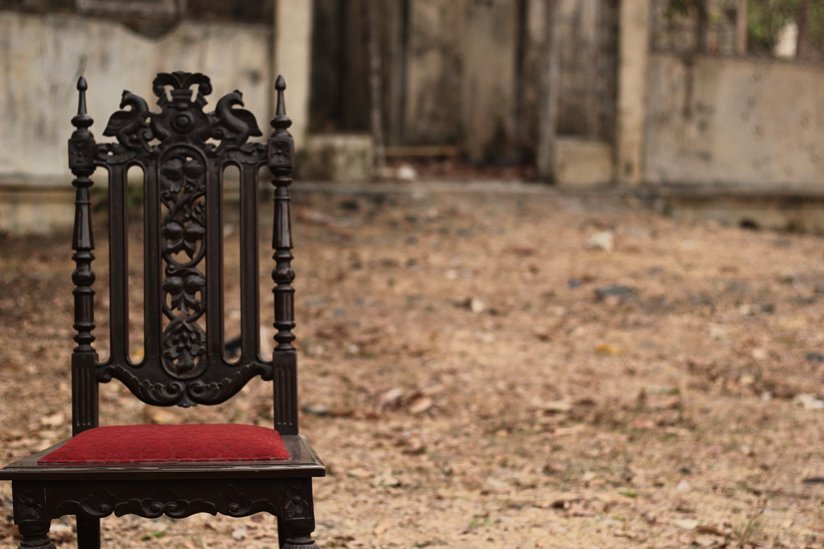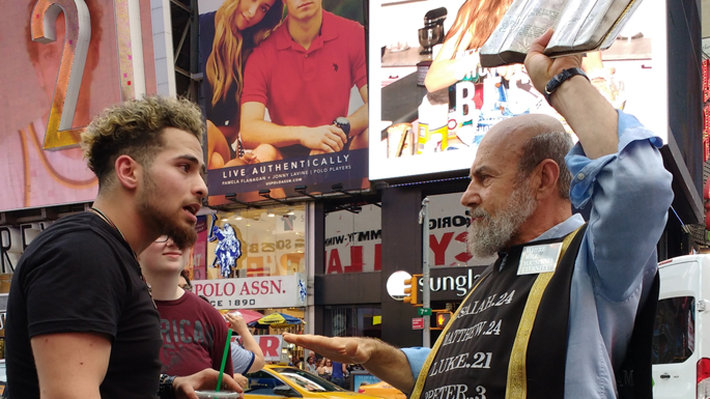
-
HOME
-
WHAT IS STANDOur Mission Our Values Our Help Contact
-
WHAT WE FIGHT FORReligious Freedom Religious Literacy Equality & Human Rights Inclusion & Respect Free Speech Responsible Journalism Corporate Accountability
-
RESOURCESExpert Studies Landmark Decisions White Papers FAQs David Miscavige Religious Freedom Resource Center Freedom of Religion & Human Rights Topic Index Priest-Penitent Privilege Islamophobia
-
HATE MONITORBiased Media Propagandists Hatemongers False Experts Hate Monitor Blog
-
NEWSROOMNews Media Watch Videos Blog
-
TAKE ACTIONCombat Hate & Discrimination Champion Freedom of Religion Demand Accountability
What a Catholic Taught Me About Civil Discourse
Driving home from work, I saw a chair behind a chain link fence that prevents foot traffic from gaining access to the freeway below. It was a lovely wooden chair in the most improbable of locations.
I had no idea how it had gotten there. It was just a single chair. A single viewpoint. Alone above the multitudes driving below.

That chair sadly reminded me of the deterioration of civil dialogue in our society. There is a sense of entitlement in owning a viewpoint and shouting it out to the world and ignoring the views of all others. It’s the conversational equivalent of having one chair in the room and allowing no others to sit nearby.
This is the growing deterioration of tolerance in our society. There is no such thing as a “balanced” news source à la the age of Walter Kronkite. Now you pick the message you want to hear and go to a news page that sells that viewpoint. The same is true of anything you might want to research: religion, history, health, music, politics and on and on. Pick the message you want to hear and go to the site that feeds it to you.
Yes, we are all individuals with as many individual viewpoints as we have souls breathing life into bodies. But we can find points of commonality—and need to—or else the message becomes just a lot of noise.
Sometimes YOU (not the other guy) are the one who has to change. I’ve learned that many times in my life.
Recently, I came across a video clip on a major news channel showing a confrontation that occurred on a city street outside a restaurant. There were two media personalities having breakfast who were recognized by members of an opposing political group who also happened to be in the restaurant. Apparently those of the opposing view called in their friends, who gathered outside the restaurant and proceeded to disrupt the entire area. They blocked traffic, yelled demeaning remarks, shouted expletives, threw water, tossed raw eggs and used bullhorns and whistles to scream into the ears of the two people they were insulting. It was hostile, bordering on violent and could easily have escalated to bodily harm had the police not intervened. The “protestors” even insulted the police who showed up to restore calm. The tactic the protestors were using didn’t make sense. They looked like preschoolers having a tantrum and there was obviously NO desire on their part to engage in meaningful dialogue. It was bedlam.
Too bad there wasn’t a kindergarten teacher there who could make them all sit quietly in a circle of chairs until they were so bored they would agree it would be more fun to go play than fight. They might have enjoyed the dialogue and friendship more than the chanting and hate.
To stop hate, you have to be willing to see the other guy’s viewpoint, express your own without anger, exchange in meaningful dialogue, and yes, even change your viewpoint. Sometimes YOU (not the other guy) are the one who has to change. I’ve learned that many times in my life.
For example, I had been taught by a family member to “pity” Catholics because their church was so strict. And yet, when I was an adult, one of my favorite directors in the film business was a devout Catholic. He lived his faith so beautifully in the exemplary way he treated his crew, took care of his family, and spoke respectfully to child actors.

We once had a bunch of 5-year-old children acting in a toy commercial. One little girl was a terror. She had her cohorts in tears. She was brutal. The director sat down with her and gently got into communication. He chatted with her and listened to what she had to say. Then he asked her what she had said to make the other little girl cry. She proudly announced some crazy statement of criticism that was indeed hurtful to the little girl. Then the director looked into her eyes and with the wisdom of a King Solomon told her quietly and gently, with no chastising in his tone: “You know Chloe, you don’t have to say everything you think. Let’s try that and see if you can have more fun today with the other children.”
Chloe took his gentle guidance to heart and stopped being mean. Suddenly the kids were getting along. And Chloe was visibly happier too. My respect for this director soared. He was living proof that not only did his religious beliefs work for him, but he could use them to help others. I learned a lesson that day. We all have something we can learn from the other guy, no matter his race, religion, creed or beliefs. But it is best done with gentleness, not force.
What I am seeing in this country are groups of people who think if they yell loud enough, publish hateful speech often enough, throw plenty of drama into their communications, then they will force others to conform to what they consider to be the only valid viewpoint—a single chair on a hillside above a busy freeway.









